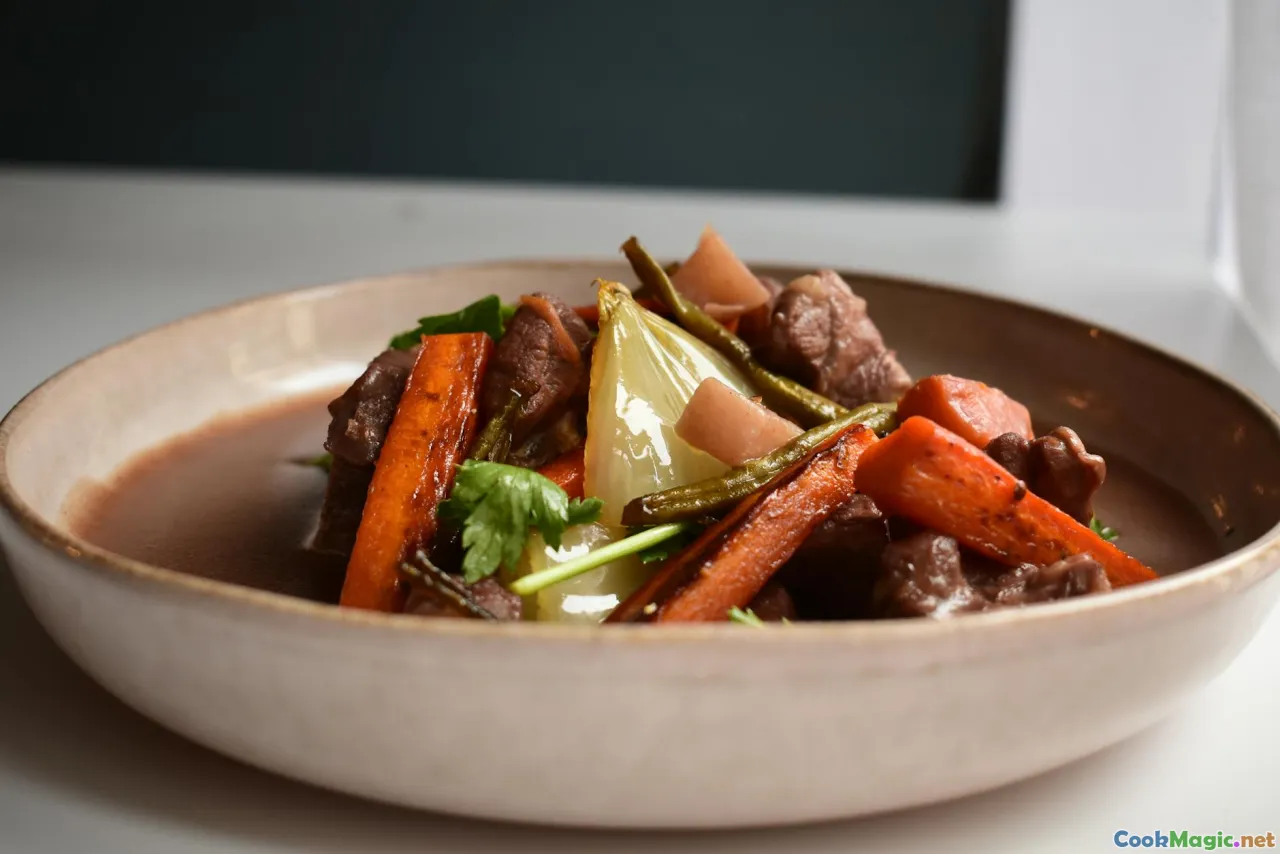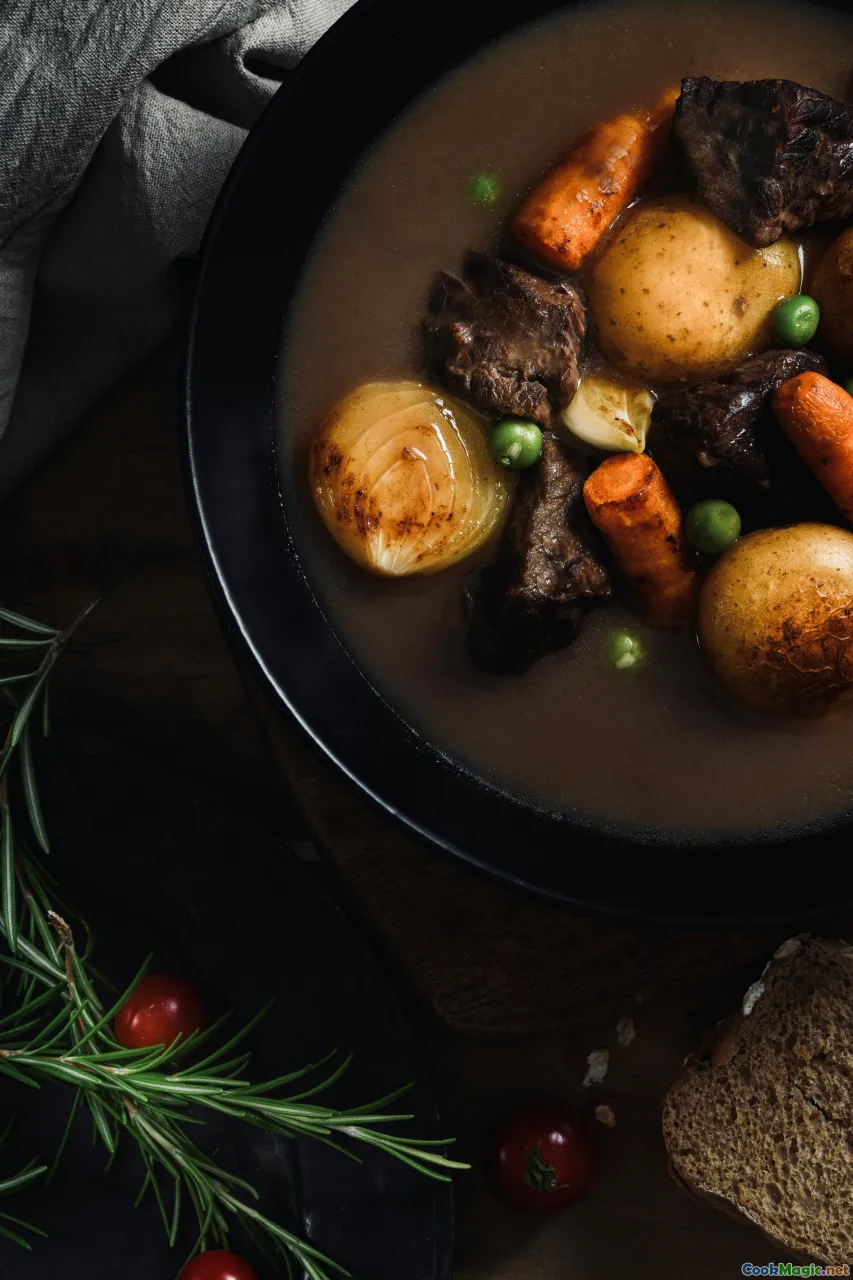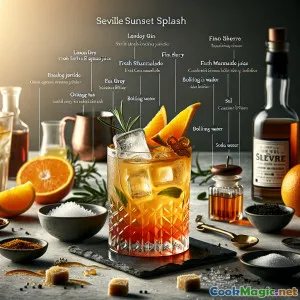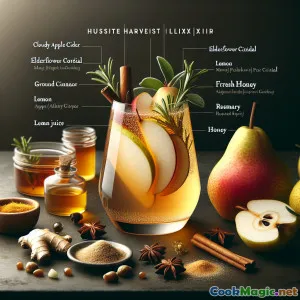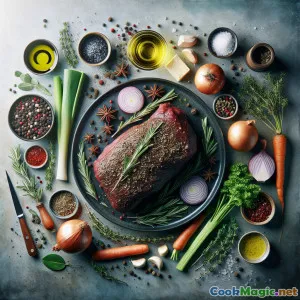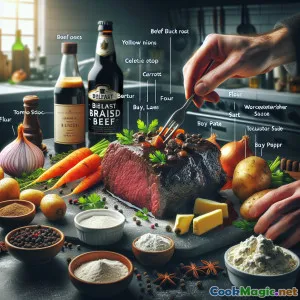
समृद्ध बेलफ़ास्ट ब्लैक ऐल बीफ़ स्टू
(Rich Belfast Black Ale Beef Stew)
(0 समीक्षाएँ)सामग्री
-
1200 grams गाय का मांस (चुक रोस्ट)
(बड़े टुकड़ों में काटें (3-4 सेमी के टुकड़े))
-
500 ml बेलफ़ास्ट ब्लैक ऐल (या समान स्टाउट)
(गिनीज़ या आयरिश स्टाउट के साथ प्रतिस्थापित किया जा सकता है)
-
2 large पीली प्याज
(टुकड़े)
-
3 medium गाजर
(छीलकर मोटे राउंड में काटा हुआ)
-
1 large शलगम
(छिला और काटा हुआ)
-
2 stalks सेलरी की टहनी
(कटा हुआ)
-
2 tbsp टमाटर का पेस्ट
-
500 ml बीफ स्टॉक
(कम सोडियम वरीयता)
-
2 tbsp आटा
(बीफ को लेप करने के लिए)
-
2 tbsp नमक रहित मक्खन
(मज़बूती और चमक जोड़ें)
-
2 tbsp वेजिटेबल ऑयल
-
6 sprigs ताजा थाइम
(या सूखे थाइम में से 1 टीस्पून का उपयोग करें)
तेज पत्ते, 2
-
2 tbsp वॉर्सेस्टरशायर सॉस
(गहराई जोड़ता है)
-
2 tsp नमक
(स्वादानुसार)
-
1 tsp काली मिर्च
(ताज़ा पिसा हुआ)
-
4 tbsp ताजा अजमोद
(बारीक कटा हुआ, सजावट के लिए)
-
3 medium आलू
(छिला हुआ और टुकड़ों में कटा हुआ; अधिक गाढ़ा, हार्दिक स्टू के लिए)
(बड़े टुकड़ों में काटें (3-4 सेमी के टुकड़े))
(गिनीज़ या आयरिश स्टाउट के साथ प्रतिस्थापित किया जा सकता है)
(टुकड़े)
(छीलकर मोटे राउंड में काटा हुआ)
(छिला और काटा हुआ)
(कटा हुआ)
(कम सोडियम वरीयता)
(बीफ को लेप करने के लिए)
(मज़बूती और चमक जोड़ें)
(या सूखे थाइम में से 1 टीस्पून का उपयोग करें)
(गहराई जोड़ता है)
(स्वादानुसार)
(ताज़ा पिसा हुआ)
(बारीक कटा हुआ, सजावट के लिए)
(छिला हुआ और टुकड़ों में कटा हुआ; अधिक गाढ़ा, हार्दिक स्टू के लिए)
पोषण
- परोसने की संख्या: 6
- सेवा आकार: एक भरपूर कटोरा (~350g)
- Calories: 683 kcal
- Carbohydrates: 28 g
- Protein: 49 g
- Fat: 38 g
- Fiber: 6 g
- Sugar: 8 g
- Sodium: 980 mg
- Cholesterol: 152 mg
- Calcium: 61 mg
- Iron: 5.5 mg
निर्देश
-
1 - बीफ़ और सब्जियों को तैयार करें:
गोमांस को टुकड़ों में काटें, नमक और काली मिर्च डालें। सभी सब्जियों को काटें और दक्षता के लिए पाउडर और तरल पदार्थ को मापें।
-
2 - बीफ़ को भूरे रंग का करें:
मध्यम-तेज़ आंच पर भारी तली वाले डच ओवन में तेल और 1 टेबलस्पून मक्खن़ डालकर गरम करें; गोमांस के टुकड़ों को आटे में लपेटें, अतिरिक्त झारें और बैचों में सुनहरा होने तक भूरा करें। निकालकर अलग रखें।
-
3 - सब्जियों को भूनें:
आग मध्यम कर दें। बची हुई मक्खन डालें; प्याज, अजमोद, गाजर और पारसनीप को मिलाएं, 8-10 मिनट तक पकाएं जब तक वे नरम हो जाएं लेकिन रंग न बदलें।
-
4 - टमाटर पेस्ट डालें और डिग्लेज़ करें:
टमाटर पेस्ट को 1-2 मिनट तक भूनें। आंच तेज करें और बेलफ़ास्ट ब्लैक ऐल को डालें, पैन के नीचे चिपके हुए टुकड़ों को स्क्रैप करें।
-
5 - भोजन धीमी आंच पर शुरू करें:
सेंकी हुई बीफ़ (और जूस) को फिर से पॉट में डालें। बीफ़ स्टॉक, थाइम, तेजपत्तियां, वैकल्पिक वोरचेस्टरशायर सॉस और वैकल्पिक आलू जोड़ें। धीरे-धीरे उबाल आने दें।
-
6 - धीमी पकाने की विधि:
ढककर आंच कम कर दें। 2.5 घंटे तक बहुत धीमी आंच पर पकाएं, हर 30 मिनट में हिलाते रहें, जब तक गोश्त कांटा-नरम और ग्रेवी गाढ़ी न हो जाए।
-
7 - अंतिम समायोजन:
थाइम/तेजपत्ता हटा दें। नमक और मिर्च के लिए स्वाद लें। कोई भी चिकनाई हटा दें। धनिये से सजा दें। गरम परोसे और क्रिस्पी आयरिश सोडा ब्रेड के साथ परोसें।
गोमांस को टुकड़ों में काटें, नमक और काली मिर्च डालें। सभी सब्जियों को काटें और दक्षता के लिए पाउडर और तरल पदार्थ को मापें।
मध्यम-तेज़ आंच पर भारी तली वाले डच ओवन में तेल और 1 टेबलस्पून मक्खن़ डालकर गरम करें; गोमांस के टुकड़ों को आटे में लपेटें, अतिरिक्त झारें और बैचों में सुनहरा होने तक भूरा करें। निकालकर अलग रखें।
आग मध्यम कर दें। बची हुई मक्खन डालें; प्याज, अजमोद, गाजर और पारसनीप को मिलाएं, 8-10 मिनट तक पकाएं जब तक वे नरम हो जाएं लेकिन रंग न बदलें।
टमाटर पेस्ट को 1-2 मिनट तक भूनें। आंच तेज करें और बेलफ़ास्ट ब्लैक ऐल को डालें, पैन के नीचे चिपके हुए टुकड़ों को स्क्रैप करें।
सेंकी हुई बीफ़ (और जूस) को फिर से पॉट में डालें। बीफ़ स्टॉक, थाइम, तेजपत्तियां, वैकल्पिक वोरचेस्टरशायर सॉस और वैकल्पिक आलू जोड़ें। धीरे-धीरे उबाल आने दें।
ढककर आंच कम कर दें। 2.5 घंटे तक बहुत धीमी आंच पर पकाएं, हर 30 मिनट में हिलाते रहें, जब तक गोश्त कांटा-नरम और ग्रेवी गाढ़ी न हो जाए।
थाइम/तेजपत्ता हटा दें। नमक और मिर्च के लिए स्वाद लें। कोई भी चिकनाई हटा दें। धनिये से सजा दें। गरम परोसे और क्रिस्पी आयरिश सोडा ब्रेड के साथ परोसें।
समृद्ध बेलफ़ास्ट ब्लैक ऐल बीफ़ स्टू :के बारे में ज़्यादा जानकारी
Belfast Black Ale Braised Beef: Rich Tradition, Modern Table
When the days grow short and a moody drizzle gathers outside your door, it is time to turn to the most comforting of recipes born from tradition, history, and a little creative kitchen magic. The 'Belfast Black Ale Braised Beef'—a dish reminiscent of farmhouse kitchens and bustling pub tables—combines robust beef, soulful roots, and the dark complexity of Irish ale for a meal that doesn’t just satiate, but also carries a story.
Culinary Roots & Tradition
Stews and braises form the backbone of Irish British cuisine, borne from pragmatism and the need to warm bone-cold nights. Historically, lesser cuts of beef, when well-braised, transformed from toughness into melting tenderness, soaking up every nuance of ale and spice that surrounded them. The arrival of rich Irish stouts—here notably Belfast Black Ale—sealed a countryside affinity for cooking with beer, deepening color and linking kitchen to brewery.
People of Belfast have long cherished their local black ales. Originally conceived by Hilden Brewery, one of Northern Ireland’s iconic, microbreweries, the black ale is rich, roasty, and playfully bitter, balancing perfectly with sweet root vegetables and savoury meats. Borrowing from both British and Irish influences, this braised beef is dense, glossy, aromatic, and boasts a subtle maltiness framed by a hearty broth.
Tips for Best Results
- Choose the Right Beef: Chuck is ideal—ample fat marbles the slow cooking without drying out the meat. You could also experiment with brisket or shin.
- Sear, Don’t Crowd: Searing the beef-to-deep brown ensures maximum flaavour and locks juices inside each cube.
- Ale Selection: If Belfast Black is elusive, use any Irish or British dry stout—Guinness being the classic default—with wonderful results. Avoid using mass-market lagers or overly hoppy beers.
- Root Vegetables: The sweetness of carrot and parsnip, joined by subtle celery, underpin the dark ale’s bitterness. Include potatoes for extra heartiness or keep them aside and serve with creamy mash.
- Slow-Cooking Magic: Whether on stovetop, in slow-cooker, or gently in the oven (130ºC/265ºF, covered), licit time for collagen in beef to break down and meld beautifully with the velvety sauce.
- Final Brightness: A tumult of fresh parsley uplift the stew just before serving, and crusty soda bread, while simple, is functionally mandatory for mopping your bowl.
A Modern Take with Cultural Depth
Belfast Black Ale Braised Beef is, in spirit, respectful of traditions but meant for the tastes of today: it isn’t greasy or dense, but rather satisfyingly rich—dark, yet balanced with vegetable sweetness and that punch of herbs. Worcestershire sauce, while perhaps an English imposition, serves to enhance umami; it can be omitted, but adds intriguing complexity.
The communal elements of this stew are undeniable. Serve it in a large Dutch oven at the center of your table, call your friends (or warn your family), and spoon generous helpings into deep bowls. The aroma alone will evoke tales, laughter, and perhaps conversations about Belfast’s enduring pubs, rainy afternoons, and fireside gatherings.
Unique Aspects & Reflection
What makes this dish unique isn’t just its marriage of ale and beef, nor the comfort it clearly brings—it’s also a nod to Irish-Northern heritage, where ingenuity meets local produce and artisan drink. Unlike French boeuf bourguignon or Italian stracotto, Belfast Black Ale Braised Beef is sharp, bitter-savory, and softly sweet, with a manageable ingredients list and method approachable in any home kitchen.
Don’t rush it—lean into its meditative low-and-slow simmer; cook with a stout in hand (perhaps the one reserved for the chef…) and let Belfast’s subtleties fill your home. Tucked under heaping spoonfuls, bread crusts swept through brothy puddles—this recipe offers deep satisfaction and celebration of Irish-British culinary kinship.

